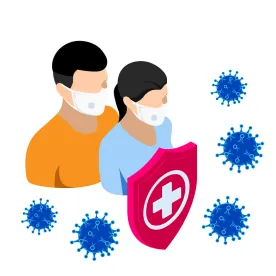On Monday, December 21, Congress enacted a $900 billion stimulus package that includes support for American health care providers and patients impacted by COVID-19, and additional funding for COVID-19 mitigation and vaccination.
The complete stimulus package contains a significant number of health care measures. The following is not intended to be a comprehensive review of all these measures, but rather a highlight of those that we feel may be of particular importance or interest to our clients.
Support for Providers and Hospitals
-
Provides $3 billion to the Provider Relief Fund, a source of funding to health care service providers who have lost revenue due to COVID-19; allows the federal Department of Health and Human Services (HHS) to distribute 85% of the grants through a process that will prioritize, among other things, a provider’s financial loss.
-
Changes how providers calculate revenue loss for purposes of applying for provider relief grants in an effort to reflect more accurate revenue losses for providers and hospitals; allows hospitals to calculate lost revenue based on their budgeted revenue, as long as a budget was in place by March 27, 2020.
-
Delays implementation of parts of the Medicare Physician Fee Schedule (specifically, the GPC1X) to mitigate the impact of cuts to certain health care providers.
-
Provides a 3.75% boost to all health care providers to offset the impact of the final implementation of the complete Medicare Physician Fee Schedule.
-
Suspends for another three months the 2% Medicare payment cut that was required under sequestration and scheduled to take effect on December 31, 2020.
-
Delays planned cuts to Medicaid disproportionate-share hospital (DSH) payments through fiscal year 2023, a provision that will help hospitals that service a high number of Medicaid patients.
Ending Surprise Medical Billing, Increasing Transparency in Provider Quality, Cost Data
-
Enacts the “No Surprises Act” to include a provision to end surprise medical billing, the circumstance in which a patient is treated out-of-network, leading to unanticipated costs for the health care services; requires providers and insurers to negotiate an agreement, with binding arbitration available if an agreement cannot be reached.
-
Prohibits gag clauses in contracts between providers and payers, allowing individuals, including patients and referring providers, to see cost and quality data on providers.
-
Makes changes to clarify aspects of the Food and Drug Administration’s (FDA) review of biosimilars and orphan drugs.
-
Provides increased transparency around biologic patents by codifying and updating the “Purple Book” maintained by the FDA.
Support for COVID-19 Mitigation and Vaccination
-
Provides $20 billion to fund free vaccinations for all Americans; also provides $8 billion to facilitate an effective and efficient vaccination process.
-
Provides $22 billion to states for help with testing, tracing, and other COVID-19 mitigation efforts.
-




 />i
/>i

